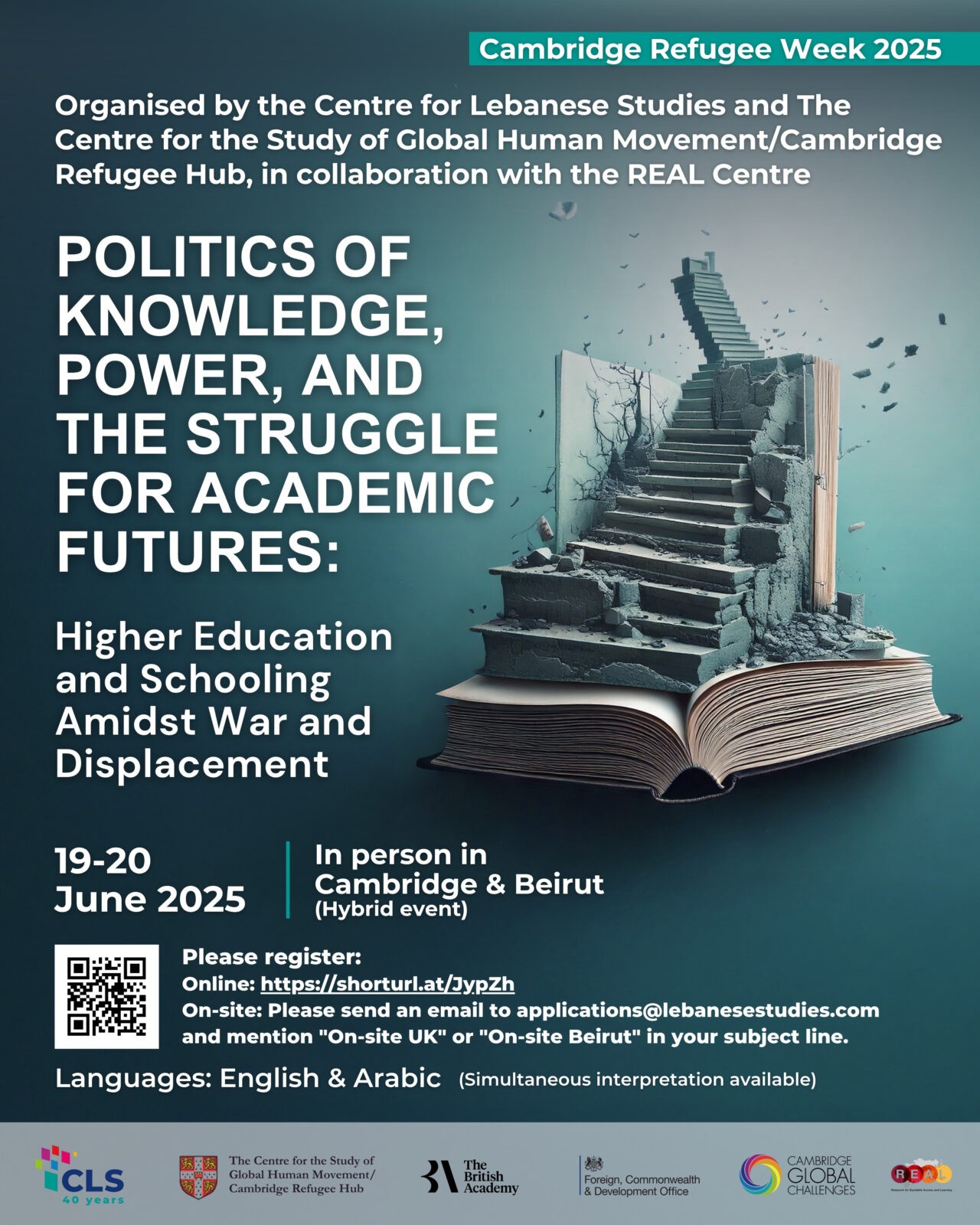
Politics of Knowledge, Power, and the Struggle for Academic Futures: Higher Education and Schooling Amidst War and Displacement
19-20 June 2025 (In person in Cambridge, UK, and Beirut, Lebanon (hybrid)
Venues
UK: Lauterpacht Centre for International Law,
University of Cambridge, Sidgwick Site,
5 Cranmer Road, Cambridge, CB3 9BL, UK
Lebanon: Crowne Plaza
Hamra Main Street, Beirut, Lebanon
Please register:
– Online: https://us06web.zoom.us/webinar/register/WN_7gDLUcwQRdetgWxYR9b3gw
– On-site: Please send an email to [email protected]
and mention “On-site UK” or “On-site Beirut” in your subject line
Organisers
– Centre for Lebanese Studies
– Cambridge Refugee Hub/ Centre for Global Human Movement
– In collaboration with REAL Centre, University of Cambridge
Languages
English and Arabic (simultaneous interpretations available)
In times of crisis, displacement, and war, education becomes both a battleground and a site of resistance. Schools and universities are not only places of learning but also spaces where power is negotiated, knowledge is contested, and futures are shaped. This conference seeks to critically examine the role of higher education and schooling amidst conflict and forced migration, bringing together scholars, students, policymakers, and practitioners to rethink the politics of knowledge production in times of upheaval.
Coinciding with World Refugee Day in June, the event interrogates dominant, top-down approaches to education in crisis settings—approaches that often reinforce global knowledge hierarchies and marginalize the voices of those most affected. It calls for a radical reimagining of education: not as a system imposed on displaced communities but as one co-led by refugees and forcibly displaced people. How can higher education and schools serve as a space of resistance, inclusion, and collaboration? What does it take to develop knowledge production models that centre local expertise, lived experience, and the agency of refugee scholars and institutions—including those operating in exile?
This conference is grounded in a decolonial ethos, foregrounding equity, relationality, and resistance to structural inequalities in global education governance. Participants will explore the challenges of building partnerships in emergency settings, the politics of solidarity, and the role of both schooling and higher education in shaping the futures of displaced populations. Key themes include:
– The power dynamics of knowledge production in crisis-affected education
– Refugee-led education initiatives and the decolonization of humanitarian aid
– The role of international organisations, donors, and local actors in shaping education governance
– The politics of academic exile and the possibilities for sustaining intellectual communities in displacement
– Strategies for co-producing research and teaching under conditions of war and forced migration
– The challenges of accountability, equity, and sustainability in education interventions
– The role of universities and in particular the University of Cambridge.
This gathering also marks the culmination of the British Academy Bilateral Chair Programme between the Centre for Lebanese Studies and the University of Cambridge. Building on years of work on refugee education and its politics, the conference offers a moment to reflect on the trajectory of the field over the past two decades—while pushing toward more just, inclusive, and sustainable academic futures.

